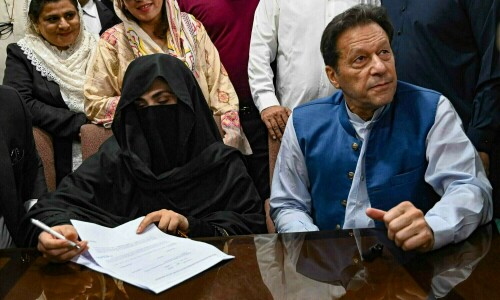MINGORA, May 26: Following last week’s peace agreement between the government and the local Taliban, life is returning fast to normalcy in the militancy-hit scenic Swat valley.
One indication that militants are returning to their homes came when a group of 800 local Taliban, holding positions on hilltops, returned home, led by their commander for Kabal sub-district, Akbar Hussain.
Militants’ spokesman Muslim Khan praised the role of the district administration in restoring peace in the insurgency-hit region and hoped that the NWFP government would compensate local people for the losses they had suffered in the military operation.
The provincial government and the Taliban in Swat signed a landmark agreement on May 21 to restore peace in the valley.
The agreement calls for gradual withdrawal of military from the mountainous region, amnesty for those not wanted in serious crimes and conversion of the militants’ seminary at Imam Dheri on the bank of the
River Swat into an Islamic university.
The militants on their part have pledged to cease all armed activities, not target public and security installations and respect the state authority.
The agreement also calls for implementation of Sharia in Malakand through a regulation, a key demand dodged by the government since 1994 when the Supreme Court of Pakistan declared the now-defunct Pata Regulation against the Constitution.
Swat, like six other districts of the NWFP and some tribal regions of Mansehra, is part of what is called the Provincially Administered Tribal Areas (Pata).
The abolition of the Pata Regulation had given new fillip to the calls for implementation of Sharia, which had led to an armed rebellion against the state in 1994 that had been quelled by law-enforcement agencies.
It resurfaced in the recent times, albeit taking a different and more violent shape.
Some analysts have criticised the ANP-PPP coalition government in the NWFP for “capitulating to extremism” by striking a deal with militants.
Some expressed concern over the reported movement and activities of militants in the valley following the peace agreement and warned of its disastrous consequences.
However, local residents are hopeful that it will be life as usual if the two sides stuck to the peace agreement.
Muslim Khan said firebrand cleric Maulana Fazlullah had asked his men to show patience and restrain to ensure peace and make efforts to erase past bitterness.
He said the two sides were preparing lists of the losses suffered by the people during the military operation and compensation to be paid to them.
The peace agreement has also emboldened local elected representatives to take part in development schemes announced by the Pakistan Army.
The military has distributed Rs10 million among union council nazims in the Chapriyal zone of Sar Banday, adjacent to the troubled Peochar valley.
A matching sum has also been distributed among union council nazims in the Matta region, where development work has started.
Another positive outcome of the agreement so far is that shops remain open in the Mingora city till 10pm. In Matta, considered to be the hotbed of militancy, shops are open till 8pm. All private and public schools and government and private offices have reopened.
But analysts warn that much depends on how quickly the government honours its part of the agreement that includes review of cases of arrested militants, conversion of the Imam Dheri seminary into a university and, chiefly, implementation of Sharia in Malakand.
They say the government will also have to take measures to reinforce its writ by ensuring good governance and security through police and paramilitary forces.












































Dear visitor, the comments section is undergoing an overhaul and will return soon.